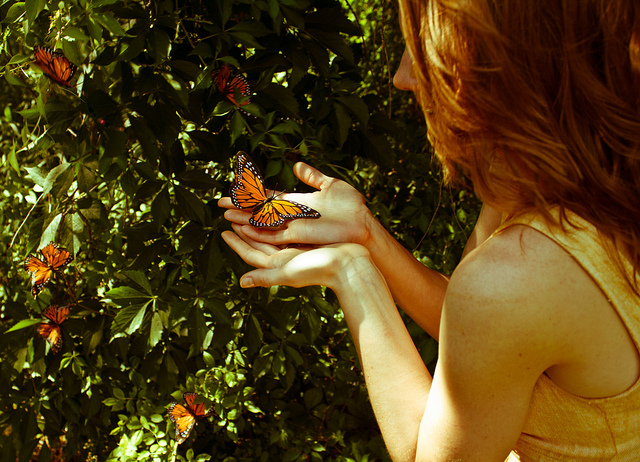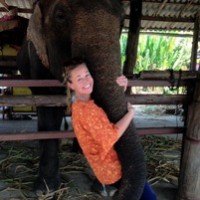Despite now having resided in this house in Spain for over a month, I still fumble with the front door house key.
It is old and clunky, resembling something that was last worn around the neck of a jail warden in a Dickens novel.
There is an art to getting it to sync with the lock. Some days I think it is more about luck than art.
“Paige!” It is the unmistakable Catalan accent of Augustina, who lives across the street.
No, not her. Anyone but the woman who, just a few weeks earlier, stopped a car that was going the wrong way down our one-way street, and then proceeded to bash in the hood with her broom, all while screaming, “muerte!” (death).
Augustina is close to my age and thus too young to have grown up during Franco’s reign of terror here back in the 50s, but apparently she believes that the simple mistake of taking a wrong turn is a crime punishable by death.
Unfortunately, the vehicle—a fancy sports car that belonged to the father of my daughter’s new best friend at school—was also fresh off the car lot and was on its way to our house for a first play date.
Since the incident, I have successfully avoided her, but after one last unsuccessful attempt with the key, I furiously turn around to face her.
Direct contact with those big brown Spanish eyes makes me uncomfortable. Yet it is less about the eye contact and more about something I recognize in them.
“Mira. Quiero a invitar para almuerzo en mi casa hoy.” (Loosely translated, “Look, I would like to invite you over for lunch at my house today.”)
While she is likely trying to make amends, I don’t think I can make things right with a woman who clearly has an anger management issue. And aside from that, the last thing I want to do is to sit down with someone with whom I otherwise have nothing in common.
“Hoy? Estoy ocupado,” (Today? I am busy.) I answer as if a reflex, even though my afternoon is free.
“Mañana?” she asks, disappointed with my response.
I see where this is going. She is going to stand here until she gets me to agree to a date, which is so stubbornly Spanish. So I ask for her mobile number. This way I can text her with an excuse and avoid any future in-person communication of any kind.
“No tengo un movil,” (I don’t have a mobile) she replies matter-of-factly. Ha, of course she doesn’t.
“Vale, mañana,” (okay, tomorrow) I sigh, not even trying to hide my annoyance.
She then gently turns my house key to the right and opens the door.
“Hasta mañana, a las dos de le tarde!” (I will see you tomorrow at two!)
Her enthusiasm is a little too enthusiastic.
Then, looking carefully in both directions before she crosses the street, hurries across before I can change my mind.
Later that night, I tell my daughter Siena that I am going to have lunch with Augustina, expecting her to criticize me for having lunch with the woman who almost destroyed her first friendship.
“That’s great mom. It sounds like she has put the incident behind her. Maybe you should too.”
Surprised by her reaction, I am silent.
Siena pauses for a moment as if trying to figure out how to share what’s in her head with me. “Most people believe that the caterpillar’s metamorphosis is a simple process that happens in stillness. But this is not the case. In the cocoon, the caterpillar is disintegrating all of its tissues that no longer serve it. And from that, a protein-rich murky soup is created to form wings, antennae, legs, eyes, genitals—basically all the new things that it will need to fly.”
“Wow, that is really interesting. I had no idea!” I can’t help but be completely enthralled by Siena’s uncanny, encyclopedic knowledge of butterflies.
Siena continues, “So to become a butterfly, the caterpillar must first let go of almost everything. It also has no choice but to let change happen so that it can evolve into something new that can fly!”
Metamorphosis is a cool thing if you happen to be a caterpillar. But I am not a caterpillar. I am an American mammal who is not so comfortable living in murky soup in which I have no control over my destiny.
The next day rolls around and I have my plan: I am going to do what the Spanish do best: arrive late, and then do what the Americans do best: leave early.
At five minutes to two, my doorbell rings and I hear Augustina: “Paige! Time for coming over!” Augustina is, for the first time, trying to speak English.
With hair not quite dry, I grab my tapa plate of zucchini hummus and Wasa crackers. I answer the door, immediately noting that Augustina, despite being the hostess, is wearing black leggings and a fanny pack.
“Que feo!” (how ugly) she says looking at the hummus. “Pero saludable!” (but healthy). She gives me a lighthearted nudge at the hip and laughs.
I laugh too, not quite sure if that is because I am uncomfortable with her honesty, or because I know she is right. The hummus is ugly, but coming from California, I am fully comfortable eating ugly, foul-smelling things so long as they are healthy.
This is not the case in Spain. And whether it is the laughter or unapologetic truth, something in me shifts.
Just when I am starting to feel comfortable with the situation, Augustina grabs my hand, as if I am a child and obsessively looks for traffic on our street, which otherwise has none because it is all of 12 feet wide.
Better that she grabbed my hand rather than her broom, I think to myself.
In Augustina’s quaint dining room, I notice the tapas of jamon and pate, olives and anchovies, as well as a beautiful torte that she explains is a recipe of her native country, Argentina.
I am surprised to learn that she is also a foreigner, meaning that we might actually have something in common. But this particular commonality is really more about sharing the same inconvenience.
And so begins an interesting teeter totter as we go back and forth from English to Spanish then Spanish to English. When I get stuck, she helps me figure out the word in Spanish. And when she gets stuck, I help her figure out the word in English.
I learn she is a painter. That she loves animals. And misses her mother in Argentina.
So, I ask her, why Spain?
Augustina answers without hesitating, “Juan Carlos.”
She then stands up as if she were on stage and makes gestures that suggest Juan Carlos has a big nose, big hands and a big everything else below the waistline, which, she comically animates, results in great sex.
Back in the States, I would have found this level of detail (and the level of energy) to be a little too much sharing upon just meeting someone.
But Augustina’s sense of humor is contagious.
It is when my chair is about to go over backwards from laughter that I look up and see a beautiful painting of a girl that must be about six years old with Augustina’s big huge eyes. I look back at Augustina and see the same expression.
She nods and immediately stops laughing.
A tear that just a moment earlier might have been from joy is now falling from grief as she explains that her daughter was hit by a car in front of this house by a driver going the wrong way. I try to find some sense of grounding as my chair makes its way back on the floor, but the sadness in the room is paralyzing.
I don’t know what do or what to say. So for a few minutes, I do nothing, which makes me so uncomfortable that I want to run.
And then my heart, the voice I have excluded for a long while, tells me exactly what I need to do: cry.
Just as the caterpillar goes through metamorphosis, we humans have to get through a complicated process to evolve: get over stuff, let go of stuff, and then despite all the baggage, let new stuff in. And we are expected to do this without a resting place or the shelter of a cocoon.
Instead, we are supposed to put up the pretense that we are okay through any part of any transition.
Coming from a culture that fosters friendship based on commonalities and shared interests, when the commonalities change, so often too, do those friends go by the wayside as if they never really existed in the first place.
With this realization, I find a part of me that is grieving too—and just haven’t acknowledged it.
I now see so clearly that it is less about building friendships based on what you might currently have in common at this moment, and more about embracing all that you do not, with laughter, with compassion and with kindness.
Just as Augustina had so effortlessly opened up my front door, she has opened up my heart to the possibilities of friendship in which differences may likely grow wider—but in also embracing that from the start.
As Augustina holds my hand again as we cross the 12 feet of concrete back to my house, it is no longer about protecting me from a car that might come around the corner, the hand-holding is more about helping me evolve from a creature that once had 16 legs to one that might soon require none.
Author: Kirsten Arpajian
Editor: Catherine Monkman
Photo: Porsche Brosseau/Flickr
~
More:









Read 44 comments and reply